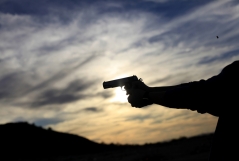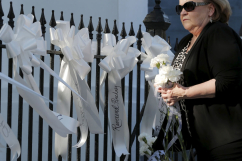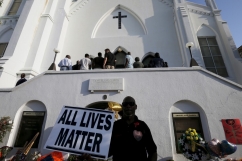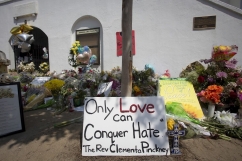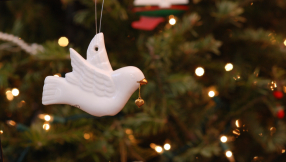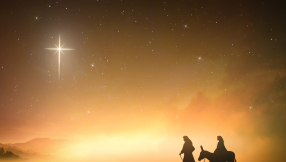Pastors in the US are introducing armed security following the June 17 shooting in Charleston.
The murder of nine members of the Emanuel African Methodist Episcopal Church has sparked concern about the vulnerability of places of worship. While Emanuel church members responded with forgiveness, and began holding Bible studies in the same room that the massacre occurred just a week after the tragic incident, other church leaders are increasing their security; ready to defend their congregations if necessary.
"If they had security, the assailant would not have been able to reload," Bishop Ira Combs, a pastor in Jackson, Michigan, declared during a service on Sunday. "All of us here are not going to turn the other cheek while you shoot us."
Combs' church, the Greater Bible Way Temple Church, has upped its security. As he preached last weekend, the pastor was flanked by a man on each side of the pulpit, each armed with handguns beneath their suit coats. A security coordinator, Calvin Williams, kept watch, listening to chatter from other security members scattered among the crowd on a Secret Service-style earpiece and toting a Taurus .45 calibre pistol tucked under his jacket. Congregants did not know who was armed and who was not – an undercover approach that is part of the security plan.
"We aren't looking to engage people in violence, but we are going to practice law enforcement," Combs told Reuters before the service. "And we are going to interdict if someone comes in with a weapon."
Carl Chinn, a Colorado-based church security consultant who tracks church violence statistics, told USA Today in 2013 that churches and religious organisations have become "softer targets" for crime. "Whenever there is a violent situation, we see security beefed up. Schools, for example, have become more hardened targets. And as we see other places get more readiness, that means other places like churches and ministries become softer targets," he said.
According to the National Church Shooting Database, there were a total of 139 shootings in US churches between 1980 and 2005, resulting in the deaths of 185 people, including 36 children. The numbers have risen since then, though there is no complete data available.
There have been several incidents in the past few years in Michigan alone. Last year at the Citadel of Praise church in Detroit, a man wielding an axe was shot by an off-duty police officer. In 2012, Pastor Marvin Winans, a member of the famous gospel singing group, was carjacked and robbed at a Detroit intersection, an event that some local pastors cite as a reason they have become security conscious.
"Nobody should have to worship in fear or be looking over their shoulder," said Charles Ellis, pastor of the Greater Grace Temple, a Pentecostal megachurch in Detroit with 6,000 members.
Ellis' church has a trained, armed, 25-man security force, nicknamed "The Ministers of Defense." Many have backgrounds in law enforcement. Some are stationed conspicuously on the stage, while others blend in with the crowd.
However, gun control is the subject of heated debate in the US, more so since the Charleston shooting, and there are many who stand against the presence of guns in sanctuaries that are supposed to be devoted to peace and reflection.
In April, church leaders criticised a Catholic priest in Ann Arbor, Michigan, after he advised worshipers to arm themselves for protection and offered a class in obtaining a concealed carry permit. The priest, Edward Fride, cancelled the class after the local diocese said it had no place on church property.
President Obama on Friday called for tighter laws. "These tragedies have become far too commonplace," he said of the shootings, noting that more than 11,000 people were killed by gun violence in the US in 2013.
Support for Obama's call for restriction is low, polls show, but the president insisted "we need a change in attitudes among everybody".
"I am not resigned," he said. "I have faith that eventually we will do the right thing."
It remains to be seen if there will be any change in gun policy in the US, or if more churches will follow the example of those who are taking matters into their own hands.
Additional reporting by Reuters










